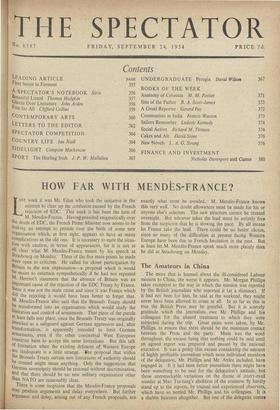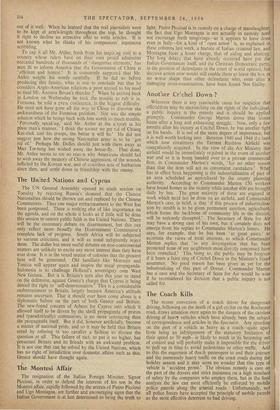The Amateurs in China
The more that is learned about the ill-considered Labour mission to China, the worse it appears. Mr. Morgan Phillips takes exception to the way in which the mission was reported by the British journalists who reported it (at a distance). If it had not been for him, he said at the weekend, they might never have been allowed to come at all. In so far as this is true the British Press may be grateful. But it is scarcely gratitude which the journalists, owe Mr. Phillips and his colleagues for the absurd treatment to which they were subjected during the trip. Great pains were taken, by Mr. Phillips, to ensure that there should be the minimum contact between the Press and the party. Mum was the word throughout, the excuse being that nothing could be said until an agreed report was prepared and passed by the national executive. It was a pretty thin excuse considering the amount of highly profitable journalism which most individual members of the delegation, Mr. Phillips and Mr. Attlee included, have 'engaged in. If it had been better journalism there might have been something to be said for the delegation's attitude, but those unremarkable variations on the theme of starry-eyed wonder at Mao Tse-tung's abolition of the common fly hardly stand up to the reports, by trained and experienced observers, which have so nettled Mr. Phillips and his colleagues. It is a shabby business altogether. But one of the delegates comes out of it well.• When he learned that the real journalists were to be kept at arm's-length throughout the trip, he thought it right to decline an attractive offer to write articles. It is not known what he thinks of his companions' ingenuous scribbling.
To cap it all Mr. Attlee, fresh from his inspir:ng visit to a country whose rulers have on their own proud admission executed hundreds of thousands of dangerous elements,' has seen fit to inform America that the Government of China is efficient and honest.' It is commonly supposed that Mr. Attlee weighs his words carefully. If he did so before producing this fatuity, what is one to conclude but that he considers Anglo-American relations a poor second to his need to steal Mr. Ancurin Bevan's thunder ? When he arrived back in London on Wednesday .he took the trouble to rub it in. Formosa, he told a press conference, is the biggest difficulty. He need not have gone all the way to China to discover the awkwardness of the Formosa problem. Nor was the simple solution which he brings back with him worth so much trouble. Personally speaking,' said Mr. Attlee at the a:rport in his plain man's manner, ' I think the sooner we get r;d of Chiang Kai-shek and his troops, the better it will be.' He did not suggest just how the strong Nationalist army is to be got rid of.' Perhaps Mr. Dulles should just wish them away as Mao Tse-tung has wished away the house-fly. That done, Mr. Attlee seems to see no reason why Americans should fail to wish away the memory of Chinese aggression, of the wounds inflicted by the Korean war, and of countless acts of barbarism since then, and settle down in friendship with the enemy.



































 Previous page
Previous page